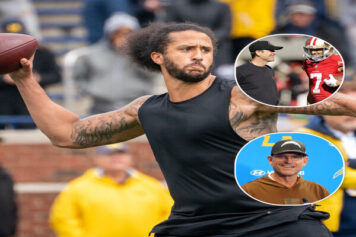The NFL honored the Civil Rights Movement during Super Bowl LIII, but still hasn’t addressed their recently history of blackballing Colin Kaepernick.
The thematic statement for Super Bowl LIII was about further solidifying Tom Brady as the GOAT, but the thematic concept may have been about something else entirely.
For Super Bowl LIII in Atlanta, Georgia, a Mecca of the Civil Rights Movement, the proceedings leading up to and during the NFL’s marquee event were literally steeped in recognition and deference to black culture.
https://twitter.com/WoodyandJimShow/status/1092205758060609543
But looming in the air was the question surrounding the continued unemployment of Colin Kaepernick.
Mostly recently, commissioner Roger Goodell made the latest in a series of noncommittal, milquetoast statements about Kap.
“I’ve said it many times privately and publicly that our clubs are the ones who make decisions about players they want on their roster,” Goodell said when asked if he was troubled by the fact that Kaepernick has not been signed and remains out of pro football. “They make those decisions individually. They all want to win. They’re all going to do whatever they can to win.”
On February 1st, sports writer Terence Moore wrote a Forbes article lambasting the NFL for using Atlanta as a “Civil Rights prop”.
“Super Bowl LIII is in Atlanta Sunday, and I’m having issues with the league suggesting throughout this week that it embraces all things civil rights, diversity and Dr. King, of course, especially since the Drum Major for Justice was born and raised in this city,” wrote Moore. “I’ve lived in the Atlanta area for 34 years, and to be fair, the NFL isn’t the only sports entity that suddenly finds that old-time religion of trying to sound inclusive whenever it holds something huge in this unofficial capital of the Deep South, which is tied with Washington D.C. for the number of blacks doing the best economically in the country.”
Moore’s piece took the NFL to task, and most of the other pieces from the regulars, New York Times, Washington Post, et. al., were on the same track regarding Kaepernick, Atlanta and the NFL’s decision to hold the Super Bowl there, which was revealed in May 2016.
Kaep’s protest began in August 2016, three months after the decision to have the Super Bowl in ATL had already been made.
Despite their being no correlation, it is a boon that the Super Bowl took place in Atlanta during Black History Month.
Several days before the Super Bowl, RISE Initiative, the King Center and the Undefeated co-hosted what was called a “Civil Rights Journey Through Atlanta” that included commissioner Roger Goodell, former NFL commissioner Paul Tagliabue, Atlanta Falcons team owner Arthur Blank, as well as current and former NFL players touring historic landmarks, such as Martin Luther King Jr‘s childhood home.
According to NFL.com, the visit was to “hear about the past that set the stage for today’s movement for social justice and racial equity”.
Meanwhile, Kaepernick attempted to follow in the footsteps of MLK and likely will never play in the NFL again as penance.
Dr. Bernice King Jr, Bill Rhoden of the Undefeated, Dr. Angela Farris-Watkins, former NFL player Brian Banks, NFL,Executive Vice President of Football Operations Troy Vincent and Rise CEO Diahann Billings-Burford were among those who participated.
https://www.youtube.com/watch?v=tJjiIuH1VnY
The gathering listened to King’s last sermon, the Drum Major, in the hallowed pews of Ebenezer Baptist Church.
Getting the Empress of Soul, Gladys Knight to sing the National Anthem, and take a “get off my lawn” swipe at Colin Kaepernick in doing so, was a major win for the NFL that almost made up for the bland Halftime performance of Maroon 5, Travis Scott and Big Boi.
She was indeed regal in her rendition of the Star Spangled Banner.
The NFL’s 100th Anniversary commercial, featuring many legends and current stars, was very well done. As a whole, the commercials for the entire program were filled with inspiring imagery of MLK, the Civil Rights Movement, Black Girl Magic, interracial oneness and other forms of contemporary idealism.
Meanwhile, the NFL just fired 70 percent of its black coaches. Shoutout to new Miami Dolphins head coach Brian Flores.
The NFL was draped in cultural blackness for Super Bowl LIII, and that is something to be applauded.
But the convenience and cover it provided to the NFL on the matters of race, support of Donald J. Trump by many of its owners, and its myriad of historic problems with domestic violence, substance abuse and CTE is troubling.
And then there’s the matter of Colin Kaepernick.



